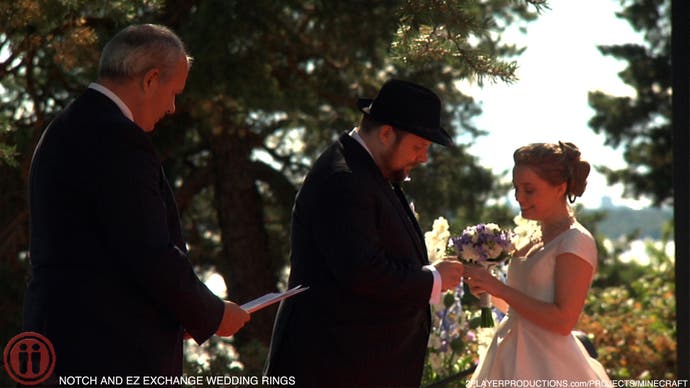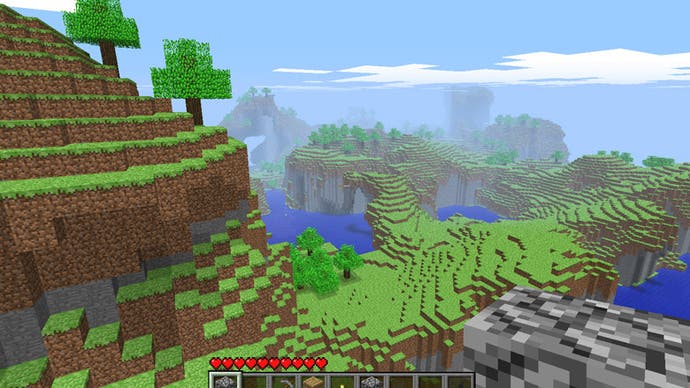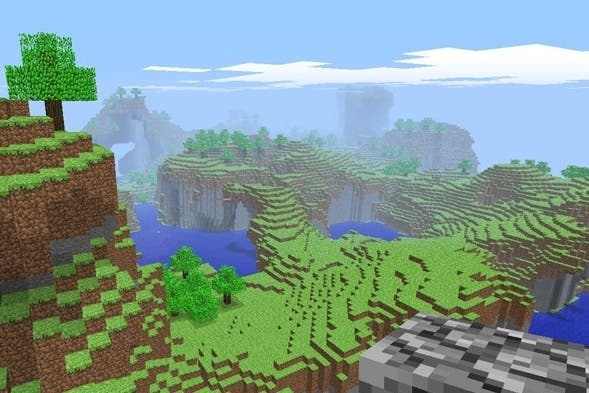Minecraft: The Story of Mojang review
Dig a little deeper.
There's a lovely moment very early on in this feature length documentary where footage of the Swedish countryside where Markus "Notch" Perrson grew up segues into the landscape of Minecraft, the bash-and-build indie hit that made his fortune.
It's an obvious edit, but one that hints at an all-important connection between tangible reality and virtual fantasy. In suggesting a source of inspiration for Notch's work, it drags gaming from its realm of ones and zeroes and into a more relatable creative sphere, where the artist draws on their own life and experience to create something universal. Sadly, that brief edit is as close of The Story of Mojang comes to unearthing any great truths about this most modern of phenomena.
That isn't to say it's not a pleasant movie. For fans of Minecraft it contains enough harmless glimpses behind the curtain and enough validation of their passion to justify its existence. It's just not terribly illuminating, and has very little to say that hasn't already been said during Minecraft's meteoric rise. The closest comparison would be the direct-to-DVD promotional films that follow the latest boyband around on tour, offering a veneer of candid insight but mostly serving to tell fans what the singer's favourite colour is.
A key problem is that there is no "story of Mojang". Man makes game, founds company, does very well. It's a story of sorts, but hardly the sort of tale that demands to be told. Instead, the film almost treats the creation of both Minecraft and Mojang as a foregone conclusion, hurriedly speeding through the formative moments of each in just a few moments. There's no insight into where the idea came from, and no attempt to frame Notch's decision to go indie as anything other than a whim.
The film then takes a haphazard stroll through the original Mojang office, briskly introducing the other members of staff and rushing through a few meetings where the team bat around ideas of what the final "finished" version of Minecraft will be.
Before any of those seeds can bear fruit, however, the film changes track and follows Notch as he ventures out from Sweden for the first time to attend GDC and E3. It's here that the film is at its strongest, as there's an actual human story to be told here - that of a fan suddenly being lauded alongside his lifelong heroes.
Interviews with Tim Schafer and Peter Molyneux add weight to the theme. Molyneux openly admits that Minecraft is a better game than anything he's ever made and it's pretty clear that Notch's success was one of the motivating factors in his leaving Microsoft. And, at the same time, we see Notch surrounded by fans and struggling to take it all in.
There's fertile soil here, but the film struggles to dig into it. This is largely due to Notch himself, who keeps everything at arms length. Not so much through arrogance or other diva style behaviour but because he has the naturally unassuming and self-deprecating demeanour of a die-hard coder. He even admits he'd rather be coding than go to E3 to market himself, and his interview segments rarely elicit answers more insightful than a chuckle and an awkward deflection. He's clearly a very nice man, but one with little interest in sharing himself on camera. This reticence inevitably ends up harming the movie, since it means that while the key player is almost always on-screen, he's forever out of reach.
Having reached a narrative impasse, the film takes an ill-advised detour into exploring the phenomenon of Minecraft itself, interviewing the people from Minecraft-centric YouTube channels such as Yogscast and The Shaft. There's also a lengthy and fairly superfluous section interviewing hardcore Minecrafters - one is building a 1:1 scale model of the USS Enterprise, the other has constructed a working binary processor in the game using redstone switches. As an illustration of Minecraft's potential it's fine, but these segments run too long, do nothing to further our understanding of the still elusive Mojang story, and end up feeling like padding.
"Games are getting better at telling stories within their fiction, but we still can't quite find the way to make the creative process itself come to life."

Time spent with a class of US schoolchildren whose teacher uses Minecraft in lessons is more fruitful, if only because the kids display more energy, excitement and passion in a few minutes than everybody else in the film put together. It also leads to another moment that brushes up against actual commentary, as the kids offer their thoughts on who this "Notch" person might be, intercut with Notch himself pondering the legacy of what was once a simple tech demo.
There are stories here, but they're rarely allowed room to develop. A film that more closely followed Notch on his first visit to the US might offer greater insight into what it's like to go from obscurity to legendary overnight. A film that tracked the rocky road to the first MineCon might have more narrative shape.
The film never really recovers from its disjointed midsection though, and whatever line it was following struggles to make itself clear as we tumble towards the end credits. The launch of the first MineCon is crammed in, but there's no sign of the effort it took to get it off the ground, or the logistical challenges of staging it. There's not even any mention of Notch's very public falling out with the Yogscast team that followed the event, despite all parties involved taking part in the film.
In fact, there's no dissent at all, no criticism, no setbacks, nothing that might sour the mood. The closest we get is one of the US schoolchildren, a girl, who says she's sick of her classmates talking about the game. As far as drama goes, that's it.

We see Notch hand lead development on Minecraft over to Jens Bergenstein, a major shift that elicits no real emotion. Notch admits that since Minecraft became a game that parents play with their children, he no longer understands its audience. This revelation coincides with footage of Notch's wedding, and a film with a more journalistic edge might probe that point to gauge Notch's feelings about family, about legacy, about anything really. Instead, like so much else, it passes in a pleasant buzz. Since conflict, compromise and adversity are essential ingredients in any story worth telling, it's an omission that the documentary can ill afford.
This is less a failing of this particular film and more a symptom of trying to find interesting and cinematic ways to cover gaming, a massively popular and important industry but one that rarely throws out interesting characters or remarkable stories that ache to be told. Where is gaming's Rock the Bells? Where is our Overnight?
The Story of Mojang's structural weakness illustrates the problem of documenting an industry that's populated largely by unassuming technicians working in quiet solitude. Games are getting better at telling stories within their fiction, but we still can't quite find the way to make the creative process itself come to life. Even Indie Game: The Movie plucks most of its drama from what amount to storms in teacups, while The King of Kong - certainly the best gaming documentary so far - is more about human nature than a pixellated ape.
Minecraft: The Story of Mojang is charming fluff, a sweet tribute to a popular game, and its piecemeal "best of" style makes for a pleasant enough affirmation for fans who want nothing more than a brief glimpse behind the scenes, but for a documentary about a game in which players are compelled to dig ever deeper in search of raw material, it's disappointingly ironic how many blocks of narrative ore the film fails to unearth.


